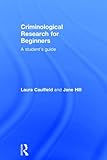Criminological research for beginners : a student's guide / Laura Caulfield and Jane Hill.
Material type: TextLanguage: English Publication details: Abingdon, Oxon : Routledge, Taylor & Francis Group, 2014.Description: xix, 245 pages ; 25 cmISBN:
TextLanguage: English Publication details: Abingdon, Oxon : Routledge, Taylor & Francis Group, 2014.Description: xix, 245 pages ; 25 cmISBN: - 9780415509602 (hardback)
- 9780415509619 (pbk.)
- 364.072 23 CAU
| Item type | Current library | Collection | Call number | Status | Date due | Barcode |
|---|---|---|---|---|---|---|
 General Books
General Books
|
CUTN Central Library Social Sciences | Non-fiction | 364.072 CAU (Browse shelf(Opens below)) | Available | 37741 |
Browsing CUTN Central Library shelves, Shelving location: Social Sciences, Collection: Non-fiction Close shelf browser (Hides shelf browser)

|

|

|

|

|

|

|
||
| 363.883 DRE The political economy of hunger : | 364 SAU Crime and Criminology / | 364 SIE Criminology | 364.072 CAU Criminological research for beginners : | 364.072 DAV Doing criminological research | 364.109 ROY True crime writings in colonial India : offending bodies and darogas in nineteenth century Bengal / | 364.132 GAR In search of Deep Throat : |
Part I : The Importance of Criminological Research --
1. Context: power, knowledge, and politics --
2. Significance: the importance of criminological research --
3. Ethics in criminological research --
Part II : Getting Going with Criminological Research --
4. Planning: Where do research ideas come from? --
5. Critiquing the literature: What do we know already? --
6. The relationship between theories and methods --
7. Preparing for the practical challenges of real-world crime research --
Part III : Doing Criminological Research: Data Collection --
8. Conducting interviews and focus groups --
9. Ethnography, case studies, and life-history approaches --
10. Questionnaires and surveys --
11. Using secondary data sources --
Part IV : Doing Criminological Research: Analysis and writing-up --
12. Analysing the data: Quantitative analysis --
13. Analysing the data: Qualitative analysis --
14. Analysing the data: Documents, images, and other data --
15. Writing-up criminological research.
Includes bibliographical references (page 231-238) and index.


There are no comments on this title.